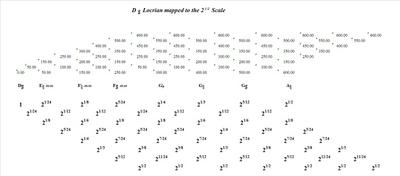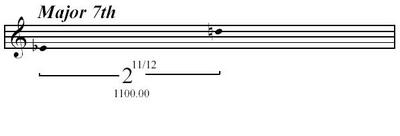 The E 5-axis Construct #1, Lydian Inversion - Scale.
The E 5-axis Construct #1, Lydian Inversion - Scale.
Monday, October 31, 2005
Blogland Responses
 Daniel Wolf has an excellent post regarding Piano Mechanics by Gordon Monahan. I had the score for that work residing on my piano for a long time as I picked my way through it and came to love the conceptual underpinnings of each study and the sound coaxed from such restrictive focus. When I finally heard a recording of the work I was floored by Monahan's technique, precision and stamina.
Daniel Wolf has an excellent post regarding Piano Mechanics by Gordon Monahan. I had the score for that work residing on my piano for a long time as I picked my way through it and came to love the conceptual underpinnings of each study and the sound coaxed from such restrictive focus. When I finally heard a recording of the work I was floored by Monahan's technique, precision and stamina.Another great Monahan experience is This Piano Thing - which is included on my recording of Piano Mechanics. I first heard this work broadcast on CBC's "2 New Hours" and went out of my way to hear it live in Montreal soon after. This Piano Thing is a work for prepared piano that applies a beautifully austere concept that sounds substantially unlike anything else I've heard for the instrument.
-------
A friendly hat-tip to the uTopian one for linking this way and adding yet more flesh to our conversation about life after John Cage and the manifesto era.
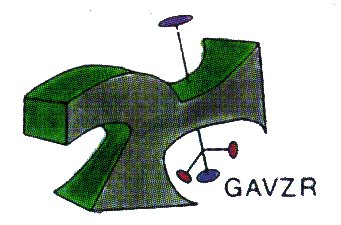
In reference to his cool Martin Williams quote (that resonated well for me) I'd say Anthony Braxton has profoundly considered the philosophical implications of ensemble improvisation (jazz or not depending on the elasticity of definitions) and how it applies to and enhances society. Having read all three of Braxton's voluminous, rough and unpublished Tri-Axiom writings I'd have to include his writings in my personal manifesto-ish reading experience. Once one acquires a fluency with his dense language and terminology there's enough ideas in there to fuel many lifetimes of creative activity.
---------
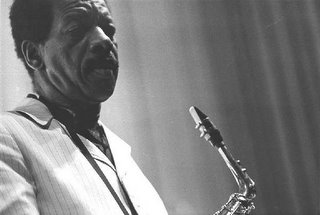 This Mark Miller interview with Ornette Coleman is sad reading for a number of reasons:
This Mark Miller interview with Ornette Coleman is sad reading for a number of reasons:Few people seem to have a grasp of harmelodic theory and the Gunther Schuller quote used in the article is excruciatingly off the mark. (As much as I admire Schuller's music I detest the bias his words betray in his definition and he completely misses the temporal dimension of harmelodic practice - allowing him to make a pretty glib and one-dimensional assessment of it). It's a theory that cannot be encapsulated into a single interview and it saddens me when the press makes light of such deep-thinking musical figures by dwelling unflatteringly on their willingness to discuss theory. Ornette Coleman has had more than his share of shoddy treatment in this regard.
It was also sad to learn that a living legend such as Ornette could be waiting by the phone to get a paying gig. What level of accomplishment is required to transcend such precariousness? How can there not be a national holiday honoring this great figure - not to mention a steady stream of well-paid gigs? Well, HurdAudio officially declares that this March 9th will be National Ornette Coleman Day. Spread the word.
--------
[update: the chair recognizes the uTopian suggestion and amends the HurdAudio declaration making March 9th International Ornette Coleman Day.]
Sunday, October 30, 2005
Saturday, October 29, 2005
Friday, October 28, 2005
Thursday, October 27, 2005
Step Up! See the Amazing Cesare
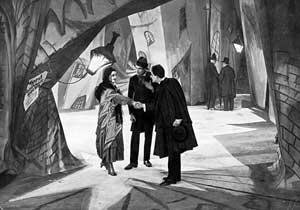 One Hallowe'en night as a college student I attended a live performance of Pierrot Lunaire by Arnold Schoenberg. This great work of chamber music on the subject of madness was such a perfect fit for the season that I've tried to put an ear toward this favorite work every year around this time. It was also a pivotal work of the early twentieth century that solidified the soprano voice, flute, clarinet, violin, cello and piano as the "Pierrot ensemble." It was an early foray into atonal harmony that served notice in 1912 of a particular harmonic path that would be further explored in the years ahead.
One Hallowe'en night as a college student I attended a live performance of Pierrot Lunaire by Arnold Schoenberg. This great work of chamber music on the subject of madness was such a perfect fit for the season that I've tried to put an ear toward this favorite work every year around this time. It was also a pivotal work of the early twentieth century that solidified the soprano voice, flute, clarinet, violin, cello and piano as the "Pierrot ensemble." It was an early foray into atonal harmony that served notice in 1912 of a particular harmonic path that would be further explored in the years ahead.Also featured on this same evening were a set of a capella works for solo soprano
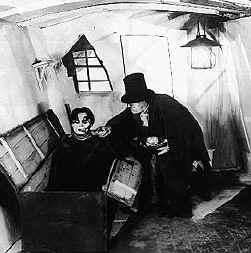 by Luciano Berio. If I remember correctly they were also focused on the subject of madness. The extended techniques that included cries, screams, sobs and moans certainly left that impression and I found those pieces both fascinating and repulsive.
by Luciano Berio. If I remember correctly they were also focused on the subject of madness. The extended techniques that included cries, screams, sobs and moans certainly left that impression and I found those pieces both fascinating and repulsive.Not wanting to dwell in a rut this Hallowe'en I thought I'd change things up and spend some time with a composition from the other half of the twentieth century that deserves many listenings.
 Das Kabinett des Doktor Caligari (The Cabinet of Dr. Caligari) is a silent film from 1920 directed by Robert Weine. I saw it as part of a film course and was struck by the severe angles of the stylized hand painted set. The aesthetics behind the visual elements of this film are attributed to the same German expressionist movement that influenced and inspired Schoenberg at the time he wrote Pierrot Lunaire. In 1994 Mark Dresser composed a brilliant score for this silent film. The instrumentation is perfect for the feel of this film and perhaps one day the trio of trumpet, prepared piano and contrabass will be known as the "Caligari Ensemble." The recording features Dave Douglas, Denman Maroney and Mark Dresser as the performers as the music drapes across the narrative shape of this early horror film. I have yet to physically experience the film and the modern score as a single experience. Perhaps one Hallowe'en I'll get ambitious and try it that way.
Das Kabinett des Doktor Caligari (The Cabinet of Dr. Caligari) is a silent film from 1920 directed by Robert Weine. I saw it as part of a film course and was struck by the severe angles of the stylized hand painted set. The aesthetics behind the visual elements of this film are attributed to the same German expressionist movement that influenced and inspired Schoenberg at the time he wrote Pierrot Lunaire. In 1994 Mark Dresser composed a brilliant score for this silent film. The instrumentation is perfect for the feel of this film and perhaps one day the trio of trumpet, prepared piano and contrabass will be known as the "Caligari Ensemble." The recording features Dave Douglas, Denman Maroney and Mark Dresser as the performers as the music drapes across the narrative shape of this early horror film. I have yet to physically experience the film and the modern score as a single experience. Perhaps one Hallowe'en I'll get ambitious and try it that way.
Wednesday, October 26, 2005
Tuesday, October 25, 2005
In Memoriam: Rosa Parks
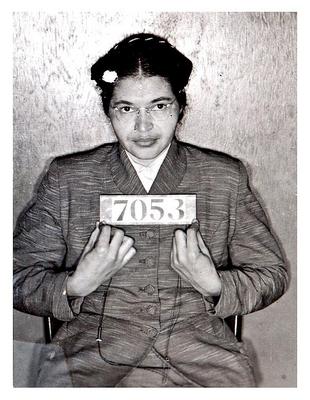 Rosa Parks passed away earlier today of natural causes. She was 92.
Rosa Parks passed away earlier today of natural causes. She was 92.Almost 50 years ago on December 1, 1955 this woman affected the course of history with the simple refusal to give up her seat on a city bus. With the arrest and boycott that followed the attention of the world was focused on the indefensible injustice of Jim Crow in Alabama and elsewhere. The civil rights movement that picked up strength from this episode continues to inspire.
Every generation should be so fortunate to have a Rosa Parks.
Monday, October 24, 2005
Scale of the Day: D Sharp Phrygian augmented 4
Sunday, October 23, 2005
Saturday, October 22, 2005
Friday, October 21, 2005
Thursday, October 20, 2005
Scale of the Day: D Sharp Locrian mapped to the Square-root-of-2
Wednesday, October 19, 2005
Cage in the Post Manifesto World
 I've been mulling over the uTopian Turtle Top post regarding John Cage (and previously linked in the Music Carnival post here) because it resonates with my own complicated feelings about this deeply influential composer.
I've been mulling over the uTopian Turtle Top post regarding John Cage (and previously linked in the Music Carnival post here) because it resonates with my own complicated feelings about this deeply influential composer.When I was 18 and filling out applications for a university education I recall having to write an essay along the lines of "If you could meet any individual, living or dead, real or work of fiction, who would it be and why?" I chose Cage. I had read Silence a couple of times by then and found it inspired. I had driven all night to Seattle to hear a premier of a new Cage work at Cornish. I could already detect his influence on so many composers that I admired that he seemed like the source of a mighty stream of American music.
I'm sure many people my age applied to that same school and wrote their own essay. I don't know who other people chose to meet in their imagination but a year later I met my "one person I would like to meet." Cage was a featured composer at a conference where I managed to get him to sign my beat up copy of Silence and later he and I had a conversation about harmony. After a lifetime of expressing unease with the traditional definition of harmony he had recently had his ears opened up to a new understanding of it through "Critical Band" by James Tenney and Pauline Oliveros' Deep Listening project. He was in his late 70s and held all the enthusiasm and awe of a child who had discovered birthday parties. It was a wonderful conversation. And meeting this charismatic soul was like discovering Santa Claus.
John Cage is Arnold Schoenberg's most influential pupil. Much more so than Webern or Berg. His music and his ideas are and were a radical challenge to challenge one's assumptions about the nature of music and learn to separate our personal biases from the inescapable bliss we often choose to ignore. I've heard several Cage compositions performed live and find enormous value in an admittedly uneven creative output.
But John "uTopian" Shaw nails it with this passage: Cage'’s famous principle of '“non-selection'” reflects a moment in history long past, when American hegemony was at its height and the 'spirit of progress'” had not yet gotten ground under the steamroller of Reaganism that reigns in America to this day; the 1950s and '60s were a time of unprecedented and unrepeated upward mobility in American economic life; an aesthetic of '“attention'” that Cage and Rauschenberg preached and practiced reflected a cultural wealth and an optimistic spirit that have long since gone to smash and splatter.
Cage lived long enough to see this process unfold. By the time I met him the era of the manifesto had passed. Somehow the art of proclaiming a bold, progressive position and aesthetic had fallen into ill repute. This is a sad passing as I reflect upon the excitement of discovering the words in Silence or Harry Partch's Genesis of a Music or even Cornelius Cardew's Stockhausen Serves Imperialism. Even the great transcendentalist writings of Emerson and Thoreau that deeply influenced Charles Ives and John Cage seem suspiciously absent of any contemporary equivalent. Which is sad. It seems that it would be nice to set out a tract in the manifesto tradition without feeling a sense of irony about it. It feels like a casualty of the failure of the serialists' broad proclamation of "the music of the future" to materialize as advertised. Now all such bold aesthetic predictions are regarded with suspicion and scorn.
The question becomes how to proceed post-Cage and post manifesto. In this path one develops a complex relationship with one's heroes. Much of Cage stays with me. He springs to mind whenever I take a walk in the woods making sure to notice all the mushrooms that are always there if you see them or not. He points toward an honesty in perception and how one learns from it that is valuable. His use of indeterminacy brings this honesty to the foreground. The "indeterminacy" as a process or procedure may not work for everyone and probably has a limited path forward. But perception remains inescapable. And in the aftermath of the "steamroller of Reaganism" that has altered so much perception and relegated so much art as mere entertainment or ecommoditycomodity it becomes an important tool and coping mechanism.

Part of what makes Cage so resonant is that it allows one to separate sound from the emotions it is assumed to provoke. In this way it has heightened my own sensitivity to (and abhorance of) music motivated by a deliberate intention to manipulate emotional responses and inoculates against it. It points toward a music that is much more transcendent than the dictatorial impulse to force a singular emotional response or association. Emotions are such a key part of the human experience that it seems like bad form to manipulate them. This is much like the unattractive element of organized religions and cults that use social pressure to demand a particular emotional attachment to prescribed points of doctrine.
The conversation I imagined having with Cage in my admissions essay was different from the conversation I actually had. And the conversation I carry on with him now in his absence is different still as this hero takes on different contexts with the passage of time.
Sunday, October 16, 2005
Saturday, October 15, 2005
Friday, October 14, 2005
Scale of the Day: G Whole-tone mapped to the Square-root-of-2
Thursday, October 13, 2005
Wednesday, October 12, 2005
Scale of the Day: G Whole-tone (2 - 1)
Tuesday, October 11, 2005
Scale of the Day: F Sharp Octotonic-1
Monday, October 10, 2005
Music Carnival #18
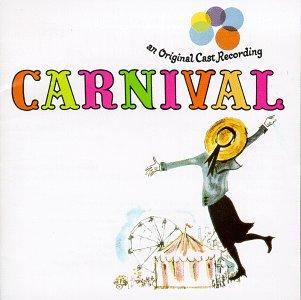 After stumbling home from an evening of too much TexasBestGrok I found the Musique Carnival #18 had parked itself right here at HurdAudio...
After stumbling home from an evening of too much TexasBestGrok I found the Musique Carnival #18 had parked itself right here at HurdAudio...The uTopianTurtleTop was off in the corner proclaiming anti-manifesto manifestos that "Cage is Dead! Long live Bob Dylan!" as Kyle Gann nodded in uncomfortable, too polite approval. Then the uTopian one turned and looked me in the eye and demanded to know my at-bat fanfare for the next big game. I contemplated a long walk from the dugout to the catchy tune of 4' 33" just as MultipleMentality pulled a lamp shade off his head to sing a few bars of "I'm gonna see Serenity!"
Something yelled out, "You know that age changes the musical mind!" and I searched frantically to find the source of such wise observations. But all I could find was a glass case on the wall containing a lone, noble viola with a note that read: "In case of emergency, break glass."
 At the thought of breaking glass Brian Sacawa came blasting through the window riding a bike and a saxophone. "Come to Tucson! And hear this!" he sang through his horn as the shards of glass settled into the cocktail set before me. I couldn't help but think that it sounds like now to me. Ah, Tucson... is it anything like Toronto? Then Sacawa's horn turned to me and in a steady stream of formant-altered multiphonics reminded me to be on the lookout for this new gem from Marty Ehrlich.
At the thought of breaking glass Brian Sacawa came blasting through the window riding a bike and a saxophone. "Come to Tucson! And hear this!" he sang through his horn as the shards of glass settled into the cocktail set before me. I couldn't help but think that it sounds like now to me. Ah, Tucson... is it anything like Toronto? Then Sacawa's horn turned to me and in a steady stream of formant-altered multiphonics reminded me to be on the lookout for this new gem from Marty Ehrlich.The Fredosphere looked up from his absinthe stupor and begged to hear a great melody with only the slightest of accompaniment. This set Daniel Wolf into a frenzy as he applied crayon to manuscript paper. The self-portrait of Arnold Schoenberg on the wall began talking to me: "While Ewartung might make a lovely at-bat fanfare, I'd have to invite Blair McMillen and Stephen Gosling to do the honors. They're such lovely pianists who require no accompaniment
 at all."
at all."All the blogosphere was still glowing from the Dr. Atomic premier. Even Sounds & Fury weighed in with anxieties of the half-life of the Pop-cultural Mindset. I don't recall so much buzz surrounding a single opera production before... let alone a modern work.
Suldog turned to me and said, "It's time to take cover down in the subway, brother." And scampered off with a big grin tattooed to his face.
 Off in the other corner I could see Bart having a well tempered debate with no one in particular over the differences between puppets that play piano versus marionettes that play the pianoforte. Under the table one could catch a wiff of Morton Feldman fueled madness (lovely sound, that). For further madness I'd recommend a season pass to NonoWorld.
Off in the other corner I could see Bart having a well tempered debate with no one in particular over the differences between puppets that play piano versus marionettes that play the pianoforte. Under the table one could catch a wiff of Morton Feldman fueled madness (lovely sound, that). For further madness I'd recommend a season pass to NonoWorld.I opened the fridge and peered into last week's take-out leftovers only to find An Overgrown Path forming mold spore images of instruments of extreme beauty. The sheer detail brought tears to my eyes and an ache to my ears.
Scott Spiegelberg then jumped up on the table and demanded to discourse on art. Then broke down into tears to find himself referenced at the Rapture Watch discussion boards. I was amused to learn from those same boards that the end can't be more than 3 years away, tops! Fools! Everyone knows that the Earth will end on June 1, 2014. Let's have an opera on that!
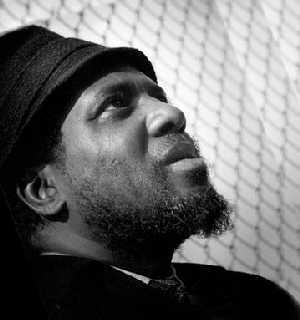 ------------------------------------------------
------------------------------------------------
Many thanks to TexasBestGrok for allowing the weekly Musical Carnival to crash at HurdAudio this week and passing along link suggestions. Please volunteer to host. These things are a blast (occasionally atomic) to put together. And don't forget Thelonious Monk's birthday is today! Celebrate here.
 ------------------------------------------------
------------------------------------------------Many thanks to TexasBestGrok for allowing the weekly Musical Carnival to crash at HurdAudio this week and passing along link suggestions. Please volunteer to host. These things are a blast (occasionally atomic) to put together. And don't forget Thelonious Monk's birthday is today! Celebrate here.
Sunday, October 09, 2005
Saturday, October 08, 2005
Friday, October 07, 2005
Thursday, October 06, 2005
HurdAudio at the Playoffs
 Last night was HurdAudio's first live post season experience as I took in game 1 of the ALDS between the Yankees and Angels down at the big A. Round one is a tough go as it only takes 3 wins to advance or 3 losses to get eliminated. These are two competitive teams so I figured there were no guarantees that there would be more than two chances to catch one of these games locally. Last year these Angels were taken out in three straight losses.
Last night was HurdAudio's first live post season experience as I took in game 1 of the ALDS between the Yankees and Angels down at the big A. Round one is a tough go as it only takes 3 wins to advance or 3 losses to get eliminated. These are two competitive teams so I figured there were no guarantees that there would be more than two chances to catch one of these games locally. Last year these Angels were taken out in three straight losses. This was my first chance to see the Yankees play live. I've spent the last ten years rooting for the Mariners so rooting against the pin stripes has been easy and reinforced every time they've knocked out the home team or made yet another trip into the playoffs. They do have some amazing talent on that team. But rooting for them is a bit like cheering for Goliath. The "underdog" thing has always had more pull.
This was my first chance to see the Yankees play live. I've spent the last ten years rooting for the Mariners so rooting against the pin stripes has been easy and reinforced every time they've knocked out the home team or made yet another trip into the playoffs. They do have some amazing talent on that team. But rooting for them is a bit like cheering for Goliath. The "underdog" thing has always had more pull.Just driving into an event with this New York team is different. I saw plenty of freshly pressed T-shirts hanging in car windows on the way into the parking lot featuring #55 Matsui or #13 Rodriguez.
 The Yankees really are a different team though. I felt that the Angels were in trouble long before the first pitch as I watched the intense professionalism of these players warming up for the game. There was such a deadly seriousness as A-Rod put on a show at batting practice. Warm-up trainers seemed to be going through some intense routines on the field and some of these guys were warming up with monster tosses between the infield and outfield. When it came time for the player introductions the dingy road uniforms seemed to hold a stark work-ethic contrast to the blinding white uniforms of the home team.
The Yankees really are a different team though. I felt that the Angels were in trouble long before the first pitch as I watched the intense professionalism of these players warming up for the game. There was such a deadly seriousness as A-Rod put on a show at batting practice. Warm-up trainers seemed to be going through some intense routines on the field and some of these guys were warming up with monster tosses between the infield and outfield. When it came time for the player introductions the dingy road uniforms seemed to hold a stark work-ethic contrast to the blinding white uniforms of the home team.  The atmosphere was up a notch from regular season games. The large crowd was actively engaged with each pitch and the free "thunder sticks" did make a big sound through sheer numbers of unison attacks. But much of the enthusiasm was cut down as Robinson Cano sent a 3 RBI double over the head of Garret Anderson in the top of the 1st inning on. In the end it was 4-2 in favor of the Bronx Bombers. Bartolo Colon's shakiness in the opening frames reminded me of his struggles against the Mariners earlier this year as he would give up a string of consecutive hits in the wake of getting two quick outs. But he did settle down and hold down some terrifying hitters. And the Angels did score on their closer, Mariano Rivera. Something you don't see often. It was good to hear some life come back into the fans in the 9th inning.
The atmosphere was up a notch from regular season games. The large crowd was actively engaged with each pitch and the free "thunder sticks" did make a big sound through sheer numbers of unison attacks. But much of the enthusiasm was cut down as Robinson Cano sent a 3 RBI double over the head of Garret Anderson in the top of the 1st inning on. In the end it was 4-2 in favor of the Bronx Bombers. Bartolo Colon's shakiness in the opening frames reminded me of his struggles against the Mariners earlier this year as he would give up a string of consecutive hits in the wake of getting two quick outs. But he did settle down and hold down some terrifying hitters. And the Angels did score on their closer, Mariano Rivera. Something you don't see often. It was good to hear some life come back into the fans in the 9th inning. Fortunately, the Angels tied this thing up with a win tonight. So there will be a game 4. The next two will be in the big apple... leaving some hope that more of these will come back to southern California. In the meantime, one can hope that the Padres defy the odds and make a good run when they bring their mismatched series home later this week.
Fortunately, the Angels tied this thing up with a win tonight. So there will be a game 4. The next two will be in the big apple... leaving some hope that more of these will come back to southern California. In the meantime, one can hope that the Padres defy the odds and make a good run when they bring their mismatched series home later this week.
Wednesday, October 05, 2005
Tuesday, October 04, 2005
Monday, October 03, 2005
Scale of the Day: F Lydian no 5
Still Reverberating in Curved Air
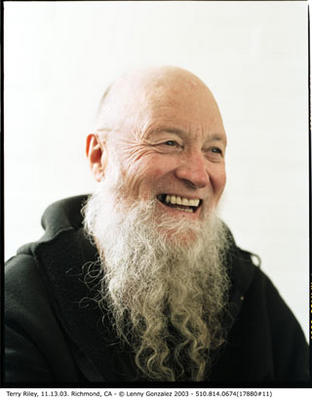 Terry Riley has turned 70 and there have been a number of celebrations over the course of this year. Last night these observances concluded in Los Angeles at UCLA's Royce Hall. HurdAudio observed the proceedings from the back of the main floor as an eclectic audience paid tribute to this influential composer of wide appeal.
Terry Riley has turned 70 and there have been a number of celebrations over the course of this year. Last night these observances concluded in Los Angeles at UCLA's Royce Hall. HurdAudio observed the proceedings from the back of the main floor as an eclectic audience paid tribute to this influential composer of wide appeal.David Sefton, the director of UCLA Live, introduced each segment of the evening's concert with enthusiasm and openly expressed passion that bordered on excessive as he declared Riley a "genius, national treasure, etc." multiple times and even led the audience in an unrehearsed "Happy Birthday" after the intermission. I completely share this enthusiasm. Terry Riley's music has meant a great deal to me over the years. My first exposure was A Rainbow in Curved Air in my teens. I am deeply familiar with that pairing of "A Rainbow in Curved Air" and "Poppy Nogood and the Phantom Band." There have been stretches where I listened to "Cadenza on the Night Plain" to the exclusion of just about everything else. And "The Harp of New Albion" plays into my twin obsessions with epic solo piano composition and just intonation. (A severely underrated composition in my opinion.) "In C" is a great, and enduring work. And there are many more Riley compositions that have caught my ear or remain to do so. A genius? A national treasure? Easily. And yet 70 seems too soon to make a retrospective evaluation as there is so much yet to be heard from this man. So let's hear it for the "first" 70 years and look forward to the next.

The evening began with a tribute work for electronics and video composed and performed by Matmos (Drew Daniel and M.C. Schmidt). Much of the manipulated source material was taken from recordings of the Kronos Quartet practicing "Sunrise of the Interplanetary Dream Collector." That's another Riley composition I'm deeply familiar with and adore. The elements of that piece that did poke through the texture managed to whet my appetite for hearing that great work again. The video elements were somewhat troubling. If the concrete nature of text in music is an aesthetic hurdle for me then video is even more so with the loaded concrete quality of video images slapping hard against the abstract beauty of the music. It took a moment to locate the conceptual unity between the video and sound as eventually the video loops did sweep me into the experience with the cyclical musical material.
This was followed by a series of pieces arranged for piano-four hands performed by Sarah Cahill and Joseph Kubera. This was the highlight of the evening for me. I was expecting to hear Riley's fantastic "Keyboard Studies" with their dense textures and static energy. Instead, these arrangements were from other works and much of it was new to me. These were intricate compositions that unfolded with the kind of narrative form reminiscent of "Cadenza on the Night Plain" or "Salome Dances for Peace." I would love to study the scores that Cahill and Kubera were playing from. I would love to hear the original instrumentations that these four-hand arrangements were taken from. And in the case of the final work they performed; I'd love to hear that one arranged for a large jazz ensemble (like the NOW Orchestra) as an improvising ensemble would preserve the spontaneous feel of that work while spreading those lush harmonies across a timbre field of horns, reeds and rhythm section. It's pieces like these that hint at how rich the creative output of Terry
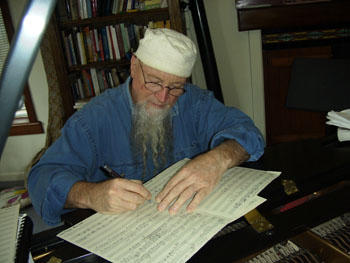 Riley really is.
Riley really is.The second half of the program began with Riley performing "A Rainbow In Curved Air" as a trio of two keyboards and William Winant on percussion (thanks Heather, it was hard to see from the back of the room... I earier referred to him as "an East Indian percussionist." Completely my mistake. William Winant is a long-time champion of new music and a great percussionist deserving more credit). The long introduction had me questioning just how well I knew this composition as Riley vamped over some sequenced patterns, simple MIDI drum machine loops and live tabla. Then the familiar analog timbres and delays kicked in and this minimalist classic came on in full force with some nice touches from the live performers. This is another work I'd love to hear interpreted by a live, acoustic ensemble with digital delay (the Bang On A Can All-Stars perhaps? This work seems like a natural for the Cantaloupe label). I once heard a recording of Katrina Krimsky interpreting "A Rainbow in Curved Air" for piano a long time ago. This one is really due for a revival in any number of instrumentations and interpretations.
Then there were a couple of duets performed by Terry Riley and his son Gyan Riley on acoustic guitar. This was another high point in the evening. Gyan is an incredible guitarist (I was well aware of this fact, having been hooked on The Book of Abbeyozzud ever since its release) and these arrangements were spot on.
During the intermission I picked up on the anticipation and dread surrounding the final work on the program. The audience seemed evenly split between those who couldn't wait for and those who couldn't wait to flee the death/speed/heavy metal version of "In C" as performed by the Acid Mothers Temple.
On my copy of Reed Streams/ L'Infonie - In C (Mantra) on the Organ of Corti label there is a version of "In C" performed by Mantra in Montreal in 1970 that is a real treat. The idea of a death/speed/metal interpretation of "In C" is an intriguing idea and I hope to hear that someday as the Acid Mothers Temple attempt was a complete failure. The guitarist at least seemed to make some passing references to the composition as he actually played a handful of the 53 cells that make up the score. The rest of the band just seemed content to "jam" in C major for an extended period of time. The front-man noodled endlessly with a sine-tone to irritating effect and the drums would clock in with a dull rock pulse complete with unimaginative fills every four bars.
I've heard "In C" performed live several times. The thing that struck me last night was that a performance that actually adheres to the compositional process of slowly building a sonic texture from a unified set of cells has a greater visceral impact than the hyper-amplification of a heavy metal band. Even the Evergreen Gamelan Ensemble rocked this one harder than Acid Mothers Temple ever could. I fondly remember a 1990 Bang on a Can performance of "In C" with a monstrous ensemble making an insane racket that gave me a splitting headache even as I loved every second of it. "In C" can take a wide range of instrumentation and interpretation, but just playing something in C doesn't make it "In C."
Even with the death/speed/heavy metal disappointment it was great to hear Terry Riley's music in so many manifestations. 70 years is something to celebrate and this man is a "national treasure."
Sunday, October 02, 2005
Scale of the Day: E Octave Subdivided - 2 Equal [NULL/2Equal]
Subscribe to:
Posts (Atom)










